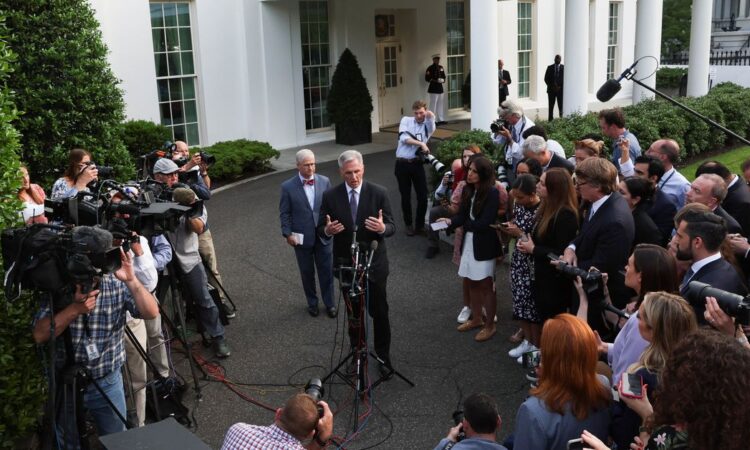
[1/2] House Speaker Kevin McCarthy speaks to reporters outside the West Wing with Rep. Patrick McHenry behind him following debt limit talks with President Joe Biden in Washington, May 22, 2023. REUTERS/Leah Millis
May 23 (Reuters) – Representatives of President Joe Biden and congressional Republicans ended another round of debt ceiling talks on Tuesday with no signs of progress as the deadline to raise the government’s $31.4 trillion borrowing limit or risk default ticked closer.
The two parties remain deeply divided about how to rein in the federal deficit, with Democrats arguing wealthy Americans and businesses should pay more taxes while Republicans wanting spending cuts.
White House negotiators Shalanda Young, director of the Office of Management and Budget, and senior White House adviser Steve Ricchetti, met with their Republican counterparts for about two hours on Tuesday. They left without making substantive comments to media.
Treasury Secretary Janet Yellen has warned that the federal government could no longer have enough money to pay all its bills as soon as June 1, which would cause a default that would hammer the U.S. economy and push borrowing costs higher.
Republican negotiator Representative Garret Graves said before Tuesday’s meeting he had seen little progress.
“I don’t think things are going well,” Graves told reporters. “They are refusing to truly change the trajectory, to truly reduce spending, and that is a red line
Biden and McCarthy emerged from a Monday evening meeting on the debt ceiling talking about the need to find bipartisan compromise, even as they cling to policies that expose the divides between the two parties.
“We reiterated once again that default is off the table and the only way to move forward is in good faith toward a bipartisan agreement,” Biden said in a statement after Monday’s meeting, which he called “productive.”
The lack of clear progress continued to weigh on Wall Street with U.S. stock indexes opening lower Tuesday morning and global markets on edge.
Biden and Democrats want to freeze spending in the 2024 fiscal year at the levels adopted in 2023, arguing that would represent a spending cut because agency budgets won’t match inflation. The idea was rejected by Republicans, who want spending cuts.
Biden wants to cut the deficit by raising taxes on the wealthy and closing tax loopholes for the oil and pharmaceutical industries. McCarthy said he will not approve tax increases.
McCarthy told reporters on Monday that he expected to talk with Biden daily at least by telephone.
If and when Biden and McCarthy reach a deal, they will still need to sell it to their caucuses in Congress. It could easily take a week to pass a deal through the House and Senate, which would both need to approve the bill before Biden could sign it into law.
DEADLINE DEBATE
Some hardline members of the Republican House Freedom Caucus on Tuesday said they were skeptical of how firm the June 1 deadline is. Treasury has said the U.S. could run short of cash as soon as June 1, or perhaps in the days following.
“Secretary Yellen needs to not only testify, but in writing, she needs to justify her dates that she’s given. Why is June 1 the drop dead?” Representative Chip Roy said in an interview.
Top House Democrat Hakeem Jeffries dismissed that skepticism as unfounded.
“The June 1 date is a real one. Secretary Yellen continues to make that clear,” Jeffries told reporters.
Unless Congress raises the debt ceiling and allows the federal government to borrow money to pay its bills, the United States could default on its obligations, potentially tipping the nation into recession and plunging global financial markets into chaos.
Any deal to raise the limit must pass both chambers of Congress, and therefore hinges on bipartisan support. McCarthy’s Republicans control the House 222-213, while Biden’s Democrats hold the Senate 51-49.
Despite the gridlock, the two sides have found some common ground on several areas, including permit reform that will help energy projects move forward.
McCarthy on Monday said including some permitting reforms in the debt deal would not solve all of the related issues and that talks on further reforms could continue later, declining to address transmission for renewable energy.
The two sides are also discussing clawing back unused COVID relief funds and imposing stricter work requirements on two popular public benefit programs aimed at helping Americans out of poverty.
But leaders cautioned that nothing has yet to be agreed upon.
“It’s very important to recognize that urgency should be the order of the day. And that is not currently the vibes I’m getting,” said Republican Representative Patrick McHenry, who chairs the House Finance Committee.
Reporting By Jarrett Renshaw; Editing by Heather Timmons and Lincoln Feast.
Our Standards: The Thomson Reuters Trust Principles.






